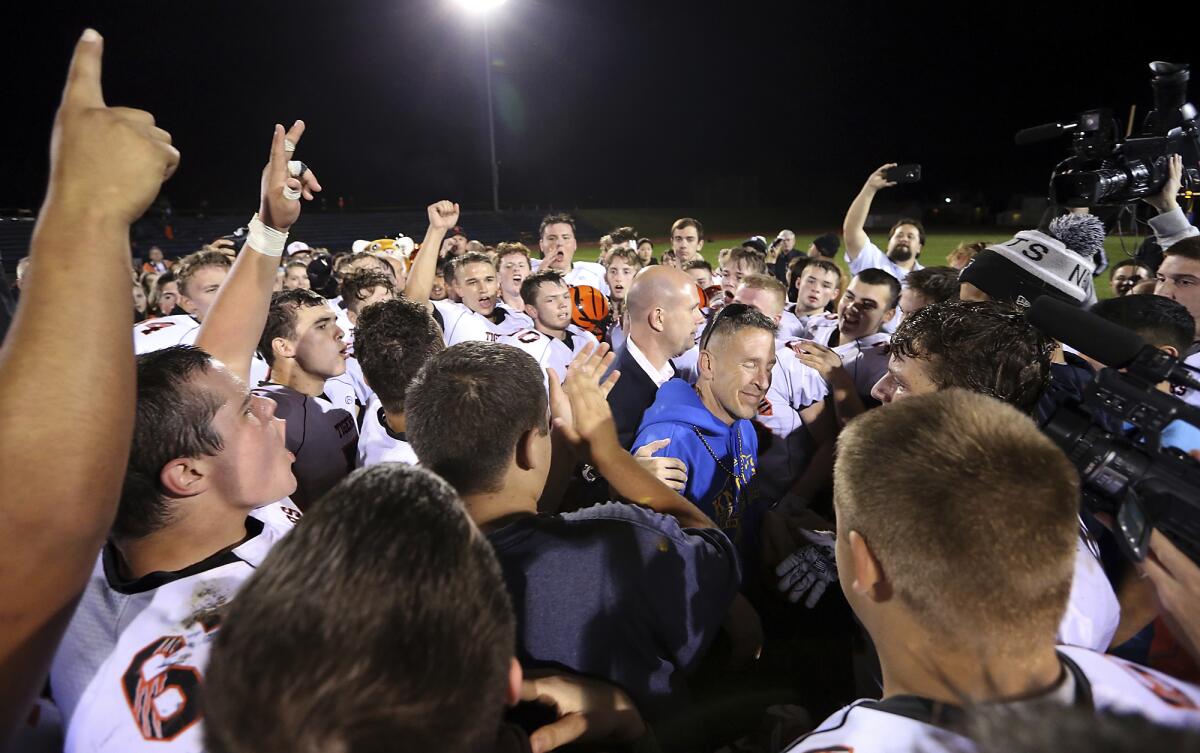Supreme Court conservatives lean toward allowing football coach’s postgame prayers

- Share via
WASHINGTON — The Supreme Court gave a mostly sympathetic hearing Monday to a former high school football coach whose prayers on the field may open the door for broader expression of religion in public schools.
The court’s conservative justices said they were prepared to amend past strict rulings that said public schools and their employees may not “endorse” or promote religion. They said that goes too far and violates the free speech and religious rights of school employees.
“Can you fire the coach for giving the sign of the cross on the field?” asked Justice Brett M. Kavanaugh, because this would be a public expression of his religious faith.
He and other justices made clear they thought the answer was no. Private religious expression deserves to be protected, they said, even when it takes place at school.
They agreed a coach or teacher would cross a line and could be disciplined for pressuring students to join or participate in a prayer or other religious activity. But they were not clear on what precise actions by a teacher or coach would put pressure on students to follow their lead.
Based on Monday’s argument, the case of Coach Joseph Kennedy vs. Bremerton School District in Washington is likely to yield a ruling that retreats again from the strict separation of church and state that had been the court’s dominant view in decades past.
The justices prohibited official school prayers and Bible readings during the 1960s, and they extended those rulings in the 1990s to forbid clerics from delivering graduation speeches or students from leading prayers over the school’s loudspeaker. Those rulings were based on the 1st Amendment’s ban on “an establishment of religion” by the government.
Kavanaugh said the court need not overturn any of those decisions to rule for the praying coach.
But the school district’s attorney and federal judges said Kennedy had turned his on-field prayers into a “spectacle” and a publicity stunt.
What began with the coach kneeling by himself on the 50-yard line became a highly publicized event in 2015 that drew a crowd of players and spectators on to the field at the end of games, they said.
School officials warned Kennedy that his on-field prayers were becoming disruptive and divisive. Lawyers for the Texas-based First Liberty Institute took up his case and sued the school district for violating his rights after the coach voluntarily left his job.
A federal judge and the 9th Circuit Court of Appeals rejected his claims and ruled for the school district.
“Kennedy’s attempt to draw nationwide attention to his challenge to [the school district] compels the conclusion that he was not engaging in private prayer, but was instead engaging in public speech of an overtly religious nature while performing his job duties,” wrote Judge Milan Smith for the 9th Circuit.
The high court agreed to hear Kennedy’s appeal based on his rights to free speech and the free exercise of religion. And during Monday’s argument, only the three liberal justices spoke in defense of the school district.
Justices Sonia Sotomayor and Elena Kagan pointed out that parents said their sons felt pressure to join the coach in his on-field prayers.
Retiring Justice Stephen G. Breyer said history shows that religion can be “divisive,” and the court should enforce a separation of church and state.
But Washington attorney Paul Clement argued this was a case about private speech, not government promotion of religion.
“When Coach Kennedy took a knee at midfield after games to say a brief prayer of thanks, his expression was entirely his own,” he said. “The government does not endorse all private religious speech just because it takes place on the school side of the gates.”
The conservative justices echoed his focus on free speech.
Justice Clarence Thomas asked about a coach kneeling on the field during the national anthem to show support for racial justice. Justice Samuel A. Alito Jr. asked whether a school employee could be disciplined for waving a Ukrainian flag on the field to show support for the struggle against the Russian invaders.
Legal scholars on the right have urged the court to scrap the so-called “endorsement test” and say public schools are not in danger if they allow some religious activity on campus.
“This is not a case about re-imposing prayer in public-school classrooms. Instead, it is a case about protecting all individuals’ right to speak freely — and to pray — in the public square,” said Notre Dame law professor Richard Garnett.
Holly Hollman, counsel for the Baptist Joint Committee, said the court should not step back from the principle of church-state separation.
“It was startling to hear the Supreme Court even consider whether public school officials can use their government position to lead religious exercises when this has been a settled question for decades,” she said. “Our Constitution protects the religious liberty of students by keeping the government from sponsoring or denigrating religion.”
More to Read
Get the L.A. Times Politics newsletter
Deeply reported insights into legislation, politics and policy from Sacramento, Washington and beyond. In your inbox three times per week.
You may occasionally receive promotional content from the Los Angeles Times.











